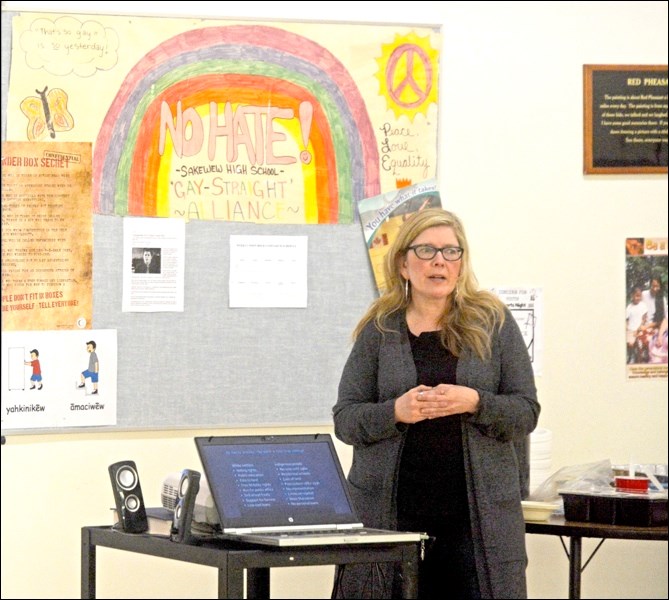Students and members of the public gathered at Sakewew High School on the evening of Feb. 1 to listen to a talk from University of Saskatchewan’s Dr. Sheelah McLean from the College of Education.
According to her profile on a University of Saskatchewan website, McLean has been teaching in secondary and adult education for 25 years, and as an instructor in Educational Foundations for 12 years. McLean’s “research and activism focus on using anti-racist theory and praxis in order to address systems of inequality in a colonial context such as racism, patriarchy, and heteronormativity.”
McLean was also a co-founder of the Idle No More movement, which gained popularity in 2013.
McLean’s comments during the presentation referenced arguments from her recent paper “We Built a Life From Nothing:” White Settler Colonialism and the Myth of Meritocracy.
Inquiries into McLean’s family history guided her research. McLean found that a number of government policies and actions by Indian Agents were to the advantage of settlers and the detriment of First Nations people.
One example was voting rights, said McLean. Settler men had voting rights since Canada’s inception, while women gained the right to vote in the early 20th century. Status Indians couldn’t vote until 1960 unless they gave up treaty rights and Indian status.
According to the Canadian Encyclopedia, John A. MacDonald was prepared to extend the federal vote to all Indians, yet after the Northwest Resistance, legislation excluded all Indian peoples living in “Manitoba, British Columbia, Keewatin [a district which included present-day Manitoba, Ontario and Nunavut] and the North-West Territories [which included Saskatchewan], and any Indian on any reserve elsewhere in Canada who is not in possession and occupation of a separate and distinct tract of land in such reserve, and whose improvements on such separate tract are not of the value of at least 150 dollars.”
The entry stated “the Metis faced no legislative restrictions on voting” including federal and provincial elections, insofar as they met voter qualifications such as age and ownership of property. The Inuit gained the right to vote federally in 1950, but many couldn’t physically vote because they lived in isolated communities. 1962 saw the introduction of ballot boxes in a number of communities.
In 1960 under John Diefenbaker, portions of the Canada Elections Act were repealed, granting status Indians the ability to vote federally. Reaction to the right to vote among First Nations people was mixed. Some welcomed the move as an opportunity to decide their fate. Some feared voting would result in the loss of rights and Indian status.
A 69-year-old woman who grew up near Meadow Lake in attendance at McLean’s event said she didn’t vote until six years ago.
“Growing up, I didn’t ever remember my grandmother and grandfather who raised me, voting in any provincial or federal election,” she said. “I never realized that [elections] were so important, that we are able to have a voice if we vote in these elections.
“But I always grew up thinking this was the white man’s election, not ours.”
Education was another difference between settlers and First Nations people as the country developed, said McLean.
Residential schools were, according to JR Miller of the University of Saskatchewan, “government-sponsored religious schools established to assimilate Indigenous children into Euro-Canadian culture.” Lessons were held in English and French (which students often didn’t understand) and Indigenous culture was discouraged.
At its height around 1930, the residential school system totaled 80 institutions. There were a number of residential schools in Saskatchewan, including those in Battleford, Regina, Onion Lake, Duck Lake, and Delmas.
Cree leader John Tootoosis attended the Delmas Indian Residential School, which burned down in 1948. Tootoosis was a president of the organization that would become the Federation of Sovereign Indigenous Nations, and later became a senator within the organization. Tootoosis played an active role in motivating federal leaders to entrench treaty rights in the Canadian Charter of Rights and Freedoms, found in the document’s section 35. Tootoosis was the father of actor Gordon Tootoosis.
First Nations people were also limited by a pass system, said McLean, a topic about which filmmaker Alex Williams released a documentary in 2015. Sakewew hosted a screening of the film that year.
Post-Northwest Resistance, federal officials were concerned about more organization from people on reserves, and a pass system, in which First Nations people needed permission from an Indian agent to leave reserves, was designed to be temporary. The pass system lasted until 1941. The system wasn’t law but rather a policy among Indian agents, said McLean
McLean said market participation was also limited for First Nations people during certain periods in Canada’s history. According to MacLean, First Nations people didn’t possess title to land, they couldn’t sell wheat freely, and couldn’t take out personal loans.
Such historical factors, along with the attitudes that influenced the decisions, McLean said, explain contemporary trends.
“This idea that [settlers] built a life from nothing is really false,” McLean said. “It’s not that my family wasn’t smart or didn’t work hard, but look at what they had access to. My grandfather was given land, political power and status.
“What the government made sure of is that my family did succeed, and when I look at it now I think the only thing they could have done to not succeed, is to do nothing,” McLean said. “[My family was] given everything they needed by the government to succeed to make sure they’d have middle class status.”
The event’s organizers included Claudette Tootoosis and Reid Stewart.




